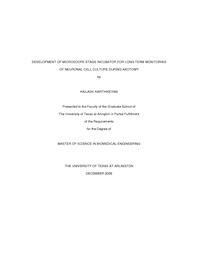
ATTENTION: The works hosted here are being migrated to a new repository that will consolidate resources, improve discoverability, and better show UTA's research impact on the global community. We will update authors as the migration progresses. Please see MavMatrix for more information.
Show simple item record
| dc.contributor.author | Karthikeyan, Kailash | en_US |
| dc.date.accessioned | 2010-03-03T23:30:44Z | |
| dc.date.available | 2010-03-03T23:30:44Z | |
| dc.date.issued | 2010-03-03T23:30:44Z | |
| dc.date.submitted | January 2009 | en_US |
| dc.identifier.other | DISS-10511 | en_US |
| dc.identifier.uri | http://hdl.handle.net/10106/2069 | |
| dc.description.abstract | It is imperative to understand the patterns in regeneration of the central and peripheral nervous system after injury. This understanding would provide a fundamental cue towards molecules and other factors involved in regeneration, and how they affect the regeneration pattern after injury. In most culturing techniques currently used for neuronal culturing and observing the neuronal regeneration, it is difficult to determine the regeneration pattern (individual axonal level) though the overall regeneration is observed due to the complexity of neuronal network. Thus a model that provides isolation of individual axons and allowing us to monitor continuously upon injury has been developed. A microfluidic system mounted onto to custom made microscope stage incubator has been demonstrated to provide optimum conditions for neuron survival during axotomy and allowing us to monitor neurons continuously providing better understanding to injury response. In this study mammalian central and peripheral neurons were cultured in the microfluidic platform. The platform consists of a microfluidic device containing micro channels for isolating single axon, a microscope incubator creating a favorable microenvironment for axons. All components are integrated into the microscope. Embryonic 16 day dorsal root ganglion and embryonic 18 day cortical neurons were cultured in the microfluidic devices. Robust outgrowth of both cortical neurons and dorsal root ganglions were observed, and individual axons growing via the micro channels in the device were observed. Various injury models have been demonstrated before but a system to monitor them closely upon injury to study their response to injury has been demonstrated and the understanding to injury response could help in developing a better treatment. | en_US |
| dc.description.sponsorship | Kim, Young-Tae | en_US |
| dc.language.iso | EN | en_US |
| dc.publisher | Biomedical Engineering | en_US |
| dc.title | Development Of Microscope Stage Incubator For Long-term Monitoring Of Neuronal Cell Culture During Axotomy | en_US |
| dc.type | M.S. | en_US |
| dc.contributor.committeeChair | Kim, Young-Tae | en_US |
| dc.degree.department | Biomedical Engineering | en_US |
| dc.degree.discipline | Biomedical Engineering | en_US |
| dc.degree.grantor | University of Texas at Arlington | en_US |
| dc.degree.level | masters | en_US |
| dc.degree.name | M.S. | en_US |
Files in this item
- Name:
- Karthikeyan_uta_2502M_10511.pdf
- Size:
- 17.47Mb
- Format:
- PDF
This item appears in the following Collection(s)
Show simple item record


